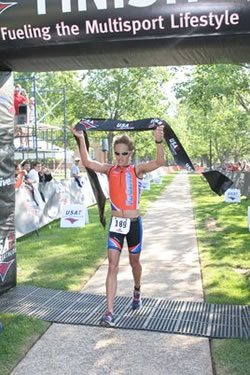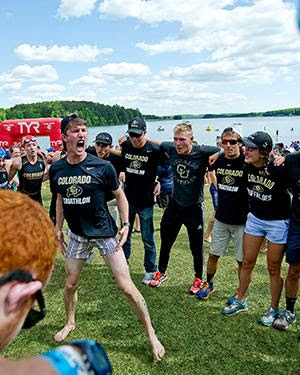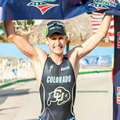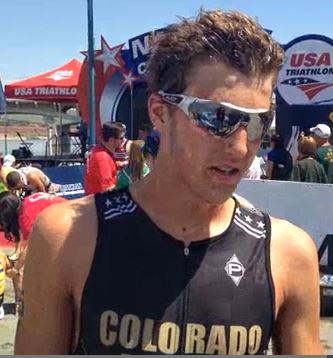2010 Race Set for Saturday in Lubbock, Texas
USA Triathlon
April 14, 2010 (Lubbock, TX) – With Collegiate Nationals a few days away, triathletes from across the country are preparing for the trek to Lubbock, hoping they have the speed and endurance to win an individual title. Three former winners, Barrett Brandon (2004), Kevin Collington (2007) and Steve Sexton (2008) look back at their collegiate triathlon experiences and how those experiences prepared them for the world of ITU racing.

USA Triathlon: How is the atmosphere at Collegiate Nationals different from other races you’ve done?
Barrett Brandon: Collegiate Nationals is one of the most enjoyable races I have done. The atmosphere, especially post race, was great. It is a very relaxed, celebratory vibe throughout the whole weekend. It was also a great way for me to meet many other triathletes from around the country.
Steve Sexton: What is interesting about collegiate nationals is that it attracts a wide range of athletes from the serious elites who hope to win to the former rugby player who borrowed a mountain bike for the race and considers the main competition to be determining who can make a bigger scene at the awards ceremony. The fact that there are so many different levels of ability and people from so many different parts of the country and different backgrounds makes the race a lot of fun. A lot of times elite ITU races are not all that well attended, so it’s nice that collegiate nationals turns out a crowd.
Kevin Collington: Collegiate Nationals has an atmosphere unlike any other race. In my opinion the team aspect of the race is the reason for that. Often times you are racing less for yourself and more for your team’s final placing. On race day you hear team cheers, school fight songs in the transition area and all of the racers are decked out in their school’s uniforms.
USAT: What’s the team aspect like for this event?
BB: All four years I attended, we had no team. In 2004, I had my training partner from University of Nebraska attend, but other than that I was flying solo!
SS: The team aspect of Collegiate Nationals is the best part of the race. The schools always show up with a lot of spirit and some crazy costumes. The rivalry is usually friendly and good natured. It is fun to travel with the team, load the bikes on to the big rental truck with the team, take over local hotels with the team, and cheer for the team. I can’t think of any sporting event I have competed in where there is a more fun team component to the event.
KC: In my opinion the team aspect really defines the event. The majority of the people racing are trying to maximize their team’s final placing. It requires a lot of team depth to win the team championship and the team unity that came about as a result really was a lot of fun.
USAT: Did winning collegiates help propel you to where you are today?
BB: Absolutely. Winning nationals in 2004 was the realization of a lot of hard work and a vindication of sorts in both my training and racing. For the first time, I won the race on the run. As a former collegiate swimmer, that was the breakthrough moment for me in the sport of triathlon. I put a lot of focus that winter on running and it paid off. Doing track workouts in the snow in January is not fun! After that win, things began to shift for me. I felt that for the first time I was no longer a swimmer who did triathlons, but a triathlete.
SS: Winning collegiate nationals motivated me to pursue my triathlon goals in a more serious way and it helped me attract sponsorship support. It is definitely a stepping stone toward a professional career.
KC: Winning the individual title in 2007 was the first step in getting to where I am today. It was my first breakout race. A local coach in Florida (Jennifer Hutchison) had started coaching me in late 2006 and really showed me that my previous self-coached training was inadequate. After three months of hard training I expected a top-10 finish so I really surprised myself when I ran away from everyone in the last 5k of the run. That result qualified me to attend a camp at the Olympic Training Center later that year. I earned a spot on the U23 World Championships team, finishing 24th as the first American. From there, USAT really started supporting me with its developmental national teams.
USAT: How is triathlon on the collegiate level different than on the elite level?
BB: At the very top of the ITU totem pole, there is a world of difference, and the same would go towards the best non-drafting and 70.3 pros. Over the last four to five years, I think almost all top-three finishers at Collegiate Nationals have gone on to race as a pro in some triathlon distance, with the majority racing in the ITU format.
SS: It brings a more diverse group of people together, which makes for fun training and competition. Some of the less serious athletes have a lot of team spirit and that helps to lighten things up at the races and make them a lot of fun. A lot of times triathlon feels like an individual sport, but not at the collegiate level, and certainly not at nationals.
KC: The team experience in collegiate racing is unlike anything I have experienced. Even racing for the United States in the ITU World Championship Series doesn’t bring the same team unity as racing for the University of Florida. In the WCS everyone on the U.S. team is racing for individual finishes and ultimately an Olympic spot—there is no team classification. With national collegiate team titles on the line at Collegiate Nationals, everyone brings their best team and goes for that team title!
USAT: What’s your experience with Project 2012/2016 been like?
BB: I have traveled around the world the last four years trying to accumulate points and increase my world ranking. The support that USAT give their funded athletes is great. Being on 2016 this year has allowed me to arrange my schedule and go to races that I had previously been unable to go to. The USOC and its support of American Olympic hopefuls is a huge reason we consistently produce the best Olympic teams—in all sports.
SS: I am really proud to be a part of the Project 2012 squad and to get to contend for a chance at the Olympics. I have been able to race in places I thought I would never go to like Chile, Korea and Hungary. I have been able to race against the top athletes in the world at the top races in the world.
KC: Project 2012 has been a huge help in my athletic development in triathlon. As a member of Project 2012 I am able to be a resident at the Olympic Training Centers, and I have lived at the OTC in Colorado Springs since last year. This alone has been a huge help. I am a big fan of training at altitude and the training support I receive at the OTC is outstanding.
USAT: Did you first compete with or against any of your current teammates on the collegiate level?
BB: Of course! I will stick to just the male side … Jarrod Shoemaker, Manny Huerta, Timothy O’Donnell, Steven Sexton, Ethan Brown and Kevin Collington are the pros I raced against either at Collegiate Nationals or World University Games who are currently on USAT’s National, Project 2012 or Project 2016 teams. It is an impressive list of pros who have come through the collegiate ranks.
SS: I competed with many athletes on USAT national teams at Collegiate Nationals—as far back as 2004. I was just getting into the sport then and had no idea who these guys were. Then in 2007 and 2008, I had to contend against some other USAT Elite Development program athletes who were among my best friends in the sport. I remember everyone placing bets on who would win among me, Kevin Collington and Ethan Brown in 2007. Kevin ended up winning that year, and I was second. In 2008, I took the win. John (Dahlz) returned the following year and grabbed the title. Barrett has since become a good friend, too.
KC: I am currently in Australia for the first race in the 2010 ITU World Championship Series in Sydney, and one of my teammates for this race is Ethan Brown. He got third at the 2007 race that I won. That was the first time I met him, and now he is one of my best friends in the sport. There are a bunch of other guys who have emerged from the collegiate ranks to race for the U.S. on the ITU circuit. The competition is getting so good at the Collegiate Nationals that if you win, you could probably race professionally on the ITU circuit.
USAT: Why do you think more colleges and universities should develop triathlon teams?
BB: I think the sport of triathlon is such a fantastic one, and every college should have some sort of triathlon program. I wish I would have had a team to go with me to nationals! Collegiate triathlon is a great medium for college students to be introduced to healthy lifestyle choices. It is a great sport that can become a lifetime pursuit, and the atmosphere at Collegiate Nationals is hard to beat. What a great event showcasing such a great sport!
SS: Triathlon is a great sport for building team spirit and inspiring students to achieve athletic goals. The collegiate teams do a good job of balancing training and social activities as they recruit new people to healthy and active lifestyles every year. Cal Triathlon introduced me to the sport that now offers me the chance of achieving my Olympic dream. I am indebted to the leaders of the team and the collegiate triathlon community who paved the way for me to achieve success in this sport.
KC: I think that would be great. Most universities have sports club departments, and all you would need to do is create the club, and hopefully the university or college will fund the team. Even with small starting budgets, a team can usually get to the National Championship race, and with team fund-raising efforts they might also be able to join a nearby collegiate conference and race in all of the conference races. The more teams the better, and hopefully with continued increases in participation the sport might one day be NCAA sanctioned!







